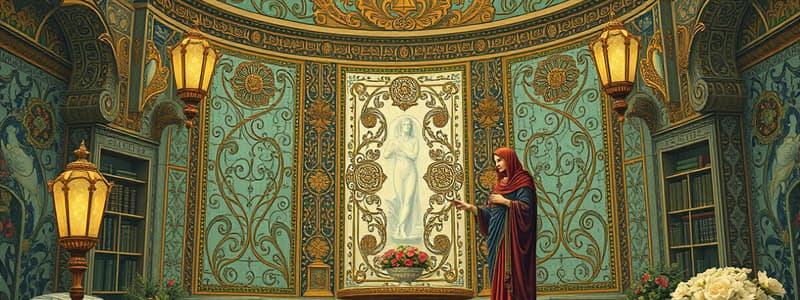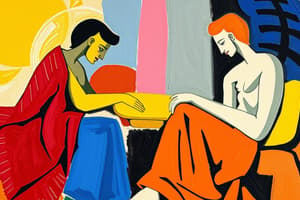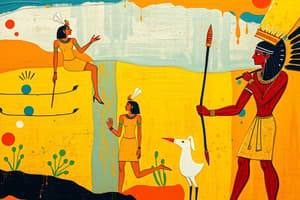Podcast
Questions and Answers
What are the three distinct periods of the Classical Period?
What are the three distinct periods of the Classical Period?
- Egyptian (correct)
- Roman (correct)
- Medieval
- Greek (correct)
What is the focus of most Egyptian art?
What is the focus of most Egyptian art?
The relationship of humans with the divine.
What was a common characteristic of Egyptian art conventions?
What was a common characteristic of Egyptian art conventions?
- Casual depictions of daily life
- Focus on vibrant colors
- Minimalist designs
- Art is subordinate to sculpture (correct)
Which of the following is a well-known Egyptian artwork?
Which of the following is a well-known Egyptian artwork?
What does the Greek phrase 'Man is the measure of all things' imply?
What does the Greek phrase 'Man is the measure of all things' imply?
Which period is known for idealized figures and athletic representations?
Which period is known for idealized figures and athletic representations?
Roman art was completely original and not influenced by Greek art.
Roman art was completely original and not influenced by Greek art.
Which technique was commonly used in Roman art?
Which technique was commonly used in Roman art?
Name one famous Roman artwork.
Name one famous Roman artwork.
What is a key characteristic of Hellenistic Greek art?
What is a key characteristic of Hellenistic Greek art?
What are mosaics?
What are mosaics?
Flashcards are hidden until you start studying
Study Notes
Overview of the Classical Period
- Spanning from 1000 BCE to 500 CE, divided into three main periods: Egyptian, Greek, and Roman.
Egyptian Art
- Primarily religious and funerary; emphasizes human-divine relationships.
- Conventions: Art serves sculpture; stylized depictions with heads and feet in profile and torsos frontal.
- Color palette: Earth tones used to symbolize power or for funerary purposes.
- Representation must be lifelike to ensure continuity in the afterlife.
Key Egyptian Artists and Works
- Notable works include the Nefertiti bust, statues of Rahotep and Nofret, and King Tut's funerary mask.
Greek Art
- Emergence of the human form as central, focusing on ideals of life, harmony, and human values.
- Notable phrase: "Man is the measure of all things."
- Emphasis on order, rationality, and symmetry while portraying gods in an anthropomorphic way.
Greek Conventions
- Limited survivability of paintings; vase painting techniques of red on black and black on red were prevalent.
- Artistic evolution: From stylized early figures to more realistic later representations.
- The Golden Age in the Fifth Century BC showcased idealized forms, while later Hellenistic art addressed human suffering and realism.
Key Greek Artists and Works
- Prominent artists include Polyclitus, Myron, and Praxiteles.
- Significant works: "Venus de Milo," "Laocoon and his Two Sons," and "Winged Victory."
Roman Art
- Romans heavily borrowed from Greek art, enhancing scale and realism.
- Conventions: Majority of Roman works have survived from Pompeii; prevalent use of fresco and mosaics.
- Sculpture echoed Greek styles, often featuring Roman figures in traditional dress; busts of emperors and heroes common.
Key Roman Artists and Works
- Notable pieces include "Augustus of Primaporta" and "Head of Constantine."
Studying That Suits You
Use AI to generate personalized quizzes and flashcards to suit your learning preferences.




